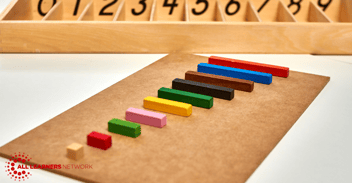
Can ALN Math Game Nights Reduce Math Anxiety?
Published: July 5, 2024
As math educators, we know how common math anxiety is. We know that it is estimated that 20-25% of students will experience some form of math anxiety, and for many, it will last into adulthood. The ramifications of math anxiety can be prolific. Math anxiety can disrupt learning, lead to negative attitudes toward math, and impact how students view their own math understanding. We know, too, that there are fairly strong correlations between math anxiety and one’s perceptions of oneself as a mathematician and how many or which math courses one takes.
Negative math identities are an unfortunate common hurdle in math learning. We know that fostering and nurturing positive math identities for all students is incredibly important. There are far too many messages out there that tell our students that only “some” people are math people and that is a mindset we are actively trying to shift in all that we do. Though common, these negative math mindsets are damaging. Our job as math educators is to make sure all students know they are capable mathematicians. One way we can do this is by ensuring positive math experiences early and often throughout childhood for every kid.
For comparison purposes, let’s consider our early relationships with reading. Take a moment to imagine a time that you were read to as a young child. What were the feelings that you experienced? Where were you doing while you were read to? Likely, you are picturing a time when you were snuggled in the arms of a loving caregiver. You likely fondly remember listening to the story while excitedly looking at the pictures, stopping to talk to the reader as you predicted what may happen next in the story. Math can be just as engaging and playful.
So, what can educators and caregivers do to create similar positive experiences around math? One tool we turn to is math games.
Math games provide a low-pressure environment where mistakes are actively welcomed and included as part of the learning process. Instead of focusing on following a procedure or getting the right answer, games encourage exploration and creative problem-solving. Games create an atmosphere where math becomes playful and flexible instead of feeling scary or finite. All of this helps to create positive feelings and experiences around math.
Schools and districts partner with All Learners Network (ALN) to create more positive math experiences for both parents and children by hosting Math Game Nights. What is a Math Game Night? Picture an elementary school cafeteria buzzing with excitement. It is 6 pm and the room is filled with the sound of rolling dice, laughter, exclamations, and joy. Imagine kids of a variety of ages gathered with their caregivers and educators playing games. Math Game Nights vary in their focus. Some have broadly focused on all K-5 students while others have had a specific content focus such as early numeracy, additive reasoning, multiplicative reasoning, and fractions.
Through attending Math Game Nights, kids experience joyful and positive math moments with both their caregivers and teachers simultaneously. Caregivers gain a better understanding of how their child is experiencing math - and gain the tools to support them through gameplay at home. We know that even as adults, many of us have wildly different experiences of math and math learning. We also know that parents truly do want what is best for their child and they want to help them get there. Math Game Nights help to give caregivers strategies to support their math learners beyond "telling the procedure." While attending these Math Game Nights, caregivers can wrap their heads around how math is being taught. Often at these events, our team starts the evening by discussion our High Leverage Concepts (HLCs) and specifically, our HLC Learning Progressions. Doing this allows us to frame how students learn math and how we approach teaching math. This can be helpful for adults who have had some of these lifelong struggles with their own math anxiety and/or math identity.
Recently, we held a multiplicative Math Game Night with a district in New England. Our Chief Financial Officer, Chris Farnham, helped host the event. In a room filled with predominantly third through fifth graders, there was a three-year-old sibling in attendance. Chris quickly realized that none of the multiplicative reasoning games were going to be accessible. Instead, she partnered with this young boy to create their own game by rolling dice and then counting counters to get to the total rolled. The next week, the same district held a pre-K Math Game Night and the mother of the three-year-old told the child that they would be going back for a math night. He excitedly asked if the nice lady was going to play more games with him. What could have been a bored child not getting to engage in more complex math, instead, was a positive memory of engaging in an accessible math game.
As simple as it sounds, creating purposeful moments of inclusive math play is critical in growing and nurturing positive math identities. Check out our professional learning and math resources platform, All Learners Online (ALO) for a wide variety of accessible, engaging, and fun math games.
Click here for the printable version.
What Now?
1. Play one of the three dice games we outline in this blog.
2. Create an ALO Free account in our online platform to access some of our games and resources.
3. Bring All Learners Network (ALN) into your school or district for a Math Game Night or embedded professional development.

All Learners Network is committed to a new type of math instruction. We focus on supporting pedagogy so that all students can access quality math instruction. We do this through our online platform, free resources, events, and embedded professional development. Learn more about how we work with schools and districts here.




